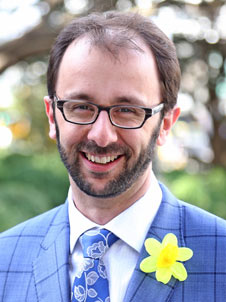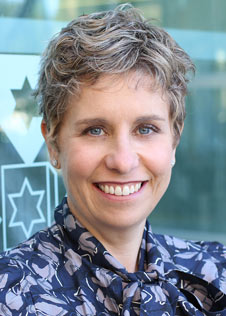 Thursday 31 January 2019 9:15am
Thursday 31 January 2019 9:15am
Dr Chris Jackson
New Zealand is at a major crossroads in cancer care and the Cancer Society are calling on government to back a nationally-led, coordinated approach to cancer.
“All New Zealanders should have access to the best care wherever they live – but currently each district health board is doing things differently. This has led to major variations in care, and a post-code lottery in cancer-care,” says Dr Chris Jackson, Medical Director for the Cancer Society.
“Cancer is the number one cause of death in NZ, and our outcomes are worse than Australia – yet incredibly, cancer isn't one of the Government's health priorities.
With the explosion of new treatments, new technology and increasingly complex care, we can't have 20 different DHBs each doing their own thing – we need a national approach.” Dr Jackson commented.
No one understands this better than 38-year-old Blair Vining. Having been diagnosed with terminal bowel cancer he's sharing his experiences in the hope the Government will make the urgent changes needed.
Blair is a speaker at this week's Cancer Care at a Crossroads Conference in Wellington, on 31 January and 1 February at Te Papa. There he'll tell hundreds of cancer-care experts how the current DHB-led system has let him down.
“My journey through the system has been very rocky. When first diagnosed I was told I'd be seen within a week for urgent treatment. But I was bounced around the system, told I'd have to wait 8 weeks for my first oncologist appointment, had to overhear doctors talking outside my room about my inoperable status, had an infected IV line as procedure wasn't followed through; then another week in hospital, and a six hour journey for urgent treatment because no-one in my local DHB was available”.
“Time is so precious to me. It's unacceptable how I've been treated,” says Blair.

Professor Diana Sarfati
Despite the challenges Blair has faced getting timely and effective treatment, he has remained positive and is making the best of his time with his family and friends.
Blair swiftly created a bucket list and is using his time and energy to make a difference. He's been actively advocating for a national cancer plan, renewing his wedding vows and fundraising for the Blair Vining Sports Foundation. A recent local rugby game and event raised over $100K to go towards Central Southland College's sports programmes.
“We have stalled in our progress against cancer and are falling behind other countries like Australia and Canada,” says Dr Jackson.
Because of this, the Cancer Society and University of Otago (Wellington), supported by the NZ Society for Oncology and the Ministry of Health, have convened the conference being held this week – a landmark gathering of national experts to “reboot” the fight against cancer.
“We need strong government-led policy to help people get early diagnosis, better access to screening and equity of outcomes for key populations groups,” says Professor Diana Sarfati of Otago University, the co-convener of the conference.
“That includes excellent, evidence-based, prevention policy focused on areas such as obesity, alcohol and smoking, to reduce the risks for cancer in our communities, as well as comprehensive, coordinated, world-class cancer treatment.” says Professor Diana Sarfati of Otago University, and co-convener of the conference.
“Our government policies are largely getting weaker on cancer, not stronger and we want to help government recognise the changes that need to be made,” continues Dr Jackson.
Last year 23,000 Kiwis were diagnosed with cancer - an increase of almost 30% in the past 10 years. That number is expected to increase further, by more than 50% over the next 15 years.
“The demand for services is soaring and creating pressure on the current system. We know cancer is New Zealand's leading cause of death, while at the same time people are living longer with a cancer diagnosis than ever before. Yet our health care and support systems are not keeping up with current demand let alone any increases,” says Dr Jackson
The Cancer Care at a Crossroads Conference brings together key players in cancer care and prevention from NZ and overseas, and is an opportunity for government, NGOs, academics and cancer-care professionals to develop cancer-care solutions. It has been developed alongside the Ministry of Health and the New Zealand Society for Oncology.
International Keynote speakers include:
- Professor Richard Sullivan, UK Professor and Director of the Institute of Cancer Policy
- Professor David Currow, Chief Cancer Officer, NSW and CE, Cancer Institute NSW
- Rami Rahal, Executive Director of Cancer Control at Canadian Partnership Against Cancer
“We want to be working together towards earlier detection and better, faster cancer treatment and support during this very difficult time in many thousands of Kiwis' lives” concludes Dr Jackson.
Australia and Canada dominating in cancer care
Visiting expert Rami Rahal from the Canadian Partnership on Cancer and a keynote speaker at the conference, told delegates that Canada set up a national organisation to focus on improving cancer outcomes and to address provincial variations in care more than 10 years ago.
"The Canadian model is a high quality system which works towards a goal where all people have access to services tailored to their individual needs,” Mr Rahal says.
“Best practice is based on what has been shown to work best and we balance best outcomes with careful use of resources. These elements support individuals in achieving the highest possible level of health and quality of life while we work to reduce the burden of cancer in the future."
New Zealand does not have an equivalent national agency.
Dr Jackson says New Zealand has much to learn from countries like Canada, which have better survival outcomes for many cancer types than New Zealand.
“We have a lot to learn from Canada's success. Their strong central leadership and national approach to improve cancer outcomes could be modelled in New Zealand,” the Medical Director of the Cancer Society says.
“But we need political leadership to achieve this. Without major change and strong political direction, we will continue to slip down the leader board for cancer survival.”
And, it is not just Canada that is showing New Zealand up. Australia is also demonstrating world-class cancer outcomes are also better than New Zealand's.
Chief Cancer Officer of New South Wales and Chief Executive Officer of the Cancer Institute NSW, the NSW Government's cancer control agency, David Currow, explains they focus on allowing primary carers to have access to diagnostics, and have a comprehensive state-wide cancer plan.
“The NSW cancer plan is comprehensive. Bringing public and private care closer together it covers prevention, screening, data analysis on outcome variations, and research,” Mr Currow explains.
“For better cancer outcomes for the whole population, our cancer plan brings primary care and oncology services closer together.”
Professor Sarfati says primary care has a vitally important role to play in improving cancer outcomes and it would be great to see New Zealand taking similar steps.
“All countries that are successful in cancer control have a comprehensive cancer plan that covers all areas of cancer from prevention through to end of life care, and includes workforce planning, data monitoring, and quality performance initiatives. New Zealand is increasingly falling behind,” Professor Sarfati says.
For further information, contact:
Mary Direen, Marketing and Communications Manager
Cancer Society National Office
Tel 04 494 7198
Cheryl Norrie
Communications Adviser
University of Otago, Wellington
Mob 021 249 6787
Email cheryl.norrie@otago.ac.nz
FIND an Otago Expert
Use our Media Expertise Database to find an Otago researcher for media comment.